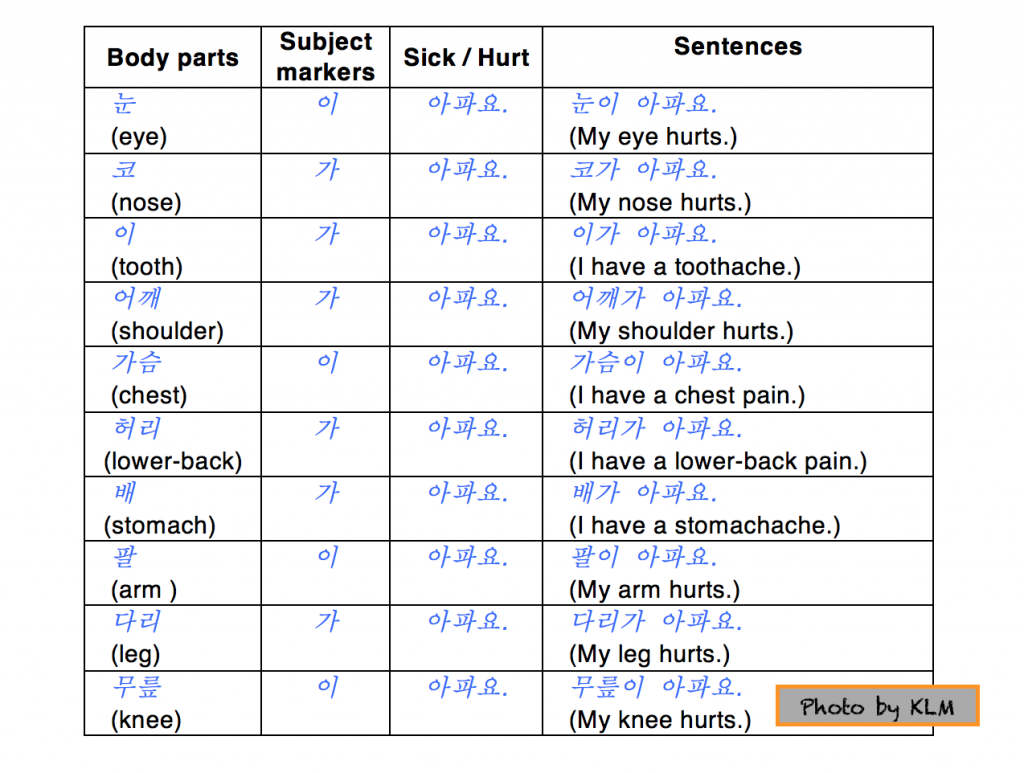Feeling Sick or Hurt??? Posted by Kyung-Hwa on Feb 15, 2017 in Grammar, Korean Language, Vocabulary
No one wants to get sick! However, when sicknesses take you by surprise, the following common expressions will help you to describe general aches and pains in Korean.

If you are feeling sick and need to see a 약사 (pharmacist) or 의사 (doctor), how would you answer this question; 어디 아파요? (Where does it hurt?) in Korean?
In order to describe your aches and pains in Korean, you can say “아파요 (hurt)” with parts of the body. For example, when you catch a cold, you can say the following:
- 머리가 아파요. (I have a headache.)
- 목이 아파요. (I have a sore throat.)
- 귀가 아파요. (I have an earache.)
Let’s try to put parts of the body with “아파요”:

* ~이/가 : subject markers in the Korean language.
♦ When a noun ends in a consonant: noun + 이
ex) 눈 (eye) +이: 눈이
♦When a noun ends in a vowel: noun + 가
ex) 코 ( nose ) + 가 : 코가
If you are having difficulty remembering certain body parts in Korean, you can simply point at the specific part and say “여기 아파요. (It hurts here.)”
A few more expressions that you may use to describe your symptoms are:
- 열이 나요. (I have a fever)
- 몸이 쑤셔요. (I have a body ache.)
- 콧물이 나요. (I have a runny nose.)
- 기침이 나요. (I have a cough.)
- 식욕이 없어요. (I have no appetite.)
- 속이 안 좋아요. (My stomach is upset. / I feel nauseous.)
When you get sick, you will frequently hear “약 먹었어요? (Did you take any medicine?) from Korean people. This is a way that Koreans show they care about you. You can simply answer “네. (Yes.)” or 아니요. (No.)”
When someone around you gets sick, you can also say the following expressions to show that you care about him/her:
- 몸조리 잘 하세요. (Please, take good care of yourself.)
- 푹 쉬세요. (Get a good rest.)
감사합니다! (Thank you!)
***Related Vocabulary***
- 약사 (pharmacist)
- 의사 (doctor)
- 어디 아파요? (Where does it hurt?)
- 아파요 (hurt)
- 머리 (head)
- 목 (throat/neck)
- 귀 (ear)
- 눈 (eye)
- 코 (nose)
- 이 (tooth)
- 어깨 (shoulder)
- 가슴 (chest)
- 허리 (lower-back)
- 배 (stomach)
- 팔 (arm )
- 다리 (leg)
- 무릎 (knee)
- * ~이/가 : subject markers in the Korean language.
♦ When a noun ends in a consonant: noun + 이
ex) 눈 (eye) +이: 눈이
♦When a noun ends in a vowel: noun + 가
ex) 코 ( nose ) + 가 : 코가
- 머리가 아파요. (I have a headache.)
- 목이 아파요. (I have a sore throat.)
- 귀가 아파요. (I have an earache.)
- 눈이 아파요. (My eye hurts.)
- 코가 아파요. (My nose hurts.)
- 이가 아파요. (I have a toothache.)
- 어깨가 아파요. (My shoulder hurts.)
- 가슴이 아파요. (I have a chest pain.)
- 허리가 아파요. (I have a lower-back pain.)
- 배가 아파요. (I have a stomachache.)
- 팔이 아파요. (My arm hurts.)
- 다리가 아파요. (My leg hurts.)
- 무릎이 아파요. (My knee hurts.)
- 열이 나요. (I have a fever.)
- 몸이 쑤셔요. (I have a body ache.)
- 콧물이 나요. (I have a runny nose.)
- 기침이 나요. (I have a cough.)
- 식욕이 없어요. (I have no appetite.)
- 속이 안 좋아요. (My stomach is upset. / I feel nauseous.)
- 약 먹었어요? (Did you take any medicine?)
- 네. (Yes.)
- 아니요. (No.)
- 몸조리 잘 하세요. (Please, take good care of yourself.)
- 푹 쉬세요. (Get a good rest.)

Build vocabulary, practice pronunciation, and more with Transparent Language Online. Available anytime, anywhere, on any device.



